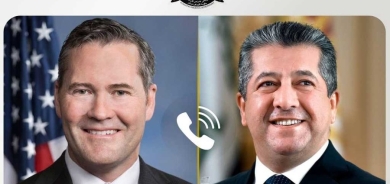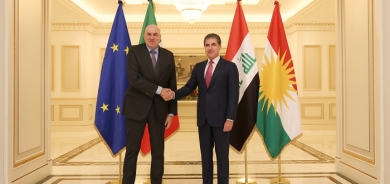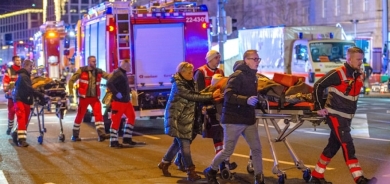Recent Western Scholarship on the Kurds in Iraq: A Retrospective

Following Mulla Mustafa Barzani’s collapse in March 1975, his son Massoud Barzani eventually emerged as the new leader of the Kurdisan Democratic Party (KDP) founded on 16 August 1946, while Jalal Talabani established his Patriotic Union of Kurdistan (PUK) on 1 June 1975. Ghareeb wrote the classic study of the Iraqi Kurds up to the demise of the elder Barzani. Batatu provides the classic mammoth background analysis of Iraq in general up to the late 1970s. Divided by philosophy, geography, dialect, and ambition, Barzani’s KDP and Talabani’s PUK have alternated between cooperation and conflict ever since. They have also suffered grievously from such horrific repression as Saddam Hussein’s genocidal Anfal campaigns of 1987-88 and the chemical attack against the city of Halabja on 16 March 1988. Makiya (writing under the pen name of Khalil) and also using his actual name, provides two trenchant books describing Saddam Hussein’s horrific tyranny. After the 1991 Gulf War and failure of the ensuing Kurdish uprising in March 1991, the mass flight of Kurdish refugees to the mountains reluctantly forced the United States to create a safe haven and no-fly zone in which a de facto Kurdish state began to develop in northern Iraq. In addition, the unprecedented United Nations Security Council Resolution 688 of 5 April 1991 condemned “the repression of the Iraqi civilian population . . . in Kurdish populated areas” and demanded “that Iraq . . . immediately end this repression.” As symbolic as it may have been, never before had the Kurds received such official international mention and protection.
The KDP and PUK actually fought a civil war against each other from 1994-98. The United States finally brokered a cease-fire by bringing Barzani and Talabani together in Washington in September 1998. The Kurds also began to receive 13 percent of the receipts from the oil Iraq was allowed to sell after 1995. This was later expanded to 17 percent. Peace, relative prosperity, and democracy began to grow in the de facto state of Kurdistan in northern Iraq. Gunter analyzes the personalities of Barzani and Talabani, the Iraqi opposition to Saddam Hussein up to 1999, and the Iraqi civil war from 1994-1998 from a rather pessimistic outlook. Yildiz’s book is a useful practical account of the Iraqi Kurdish experience including the relationship with the United States and Turkey. Stansfield has written an excellent analysis of the structure and modes of decision making in the KRG up to 2002.
On 19 March 2003, the United States finally launched a war against Iraq that quickly overthrew Saddam Hussein’s regime. The Iraqi Kurds were determined to establish at least an autonomous federal state in post-Saddam-Hussein Iraq. O’Leary, McGarry, and Salih contribute an outstanding collection of articles dealing with the politics of the Iraqi Kurds’ future constitutional options with an emphasis on the federalism option. Galbraith has a very skeptical look at the future of Iraq and the Kurds’ participation within it. Ahmad offers an enlightening analysis of the Iraqi Kurdish struggle from 1991-2006 to fashion an autonomous KRG. Lawrence contributes a well written popular account of the Iraqi Kurdish quest for statehood. Natali has a short, sophisticated analysis that shows that the type of foreign aid received by the KRG largely has determined its political, economic, and social structure. Olson describes the competition between nationalism and capitalism and the processes of state formation in Kurdistan-Iraq including how they were affected by the US invasion of Iraq from 2003-2005 and the roles of Turkey, Syria, and Iran. The International Crisis Group gives a first-hand analysis of the many problems existing between Iraq and the KRG with intelligent proposals for solutions. Stansfield and Ahmadzadeh offer a careful analysis of the various concepts of regionalism attempted by the Iraqi Kurds. Gunter illustrates how the US war in 2003 to overthrow Saddam Hussein had the fortuitous side effect of helping create the KRG.
Given the adoption of the Iraqi constitution in October 2005 and its institutionalization of federalism, Turkey has begrudgingly come to accept the existence of the KRG. Indeed, by 2009, Turkey and the KRG had begun to complement their thriving economic relationship with a promising political rapprochement as Turkey sought to further its new “zero-problems” with its neighbors’ foreign policy under its new foreign minister Ahmet Davutoglu. In the immediate aftermath of the three national elections held in 2005, the Kurds held the balance of power. To form the necessary two-thirds majority coalition government, the majority Shiite coalition had to accept the Kurdish demands for strong Kurdish rights in a democratic federal Iraq. These demands included one of the two main Kurdish leaders, Jalal Talabani, as the president of Iraq, while the Shiites gained the leading office of prime minister. Other Kurdish demands included the so-called Kurdish veto over approving or amending any future Iraqi constitution, the limited role of Islam, the rights of women, no Arab troops in Kurdistan, and the future of oil-rich Kirkuk, among others. The Kurds also decided that the other Kurdish leader, Massoud Barzani, would become president of the unified Kurdistan Regional Government. More problematic would be the interrelationship between the KRG and the national government in Baghdad regarding such crucial issues as the allocation of oil resources and the future of oil-rich Kirkuk. Article 140 of the permanent Iraqi constitution had called for a referendum on the future of Kirkuk by the end of 2007, but due to a lack of agreement had never been implemented.
In the summer of 2008, KRG and Iraqi troops almost came to blows over Khanaqin, a city on their border. Other burning issues included relations with Turkey, the PKK which maintained bases in the KRG’s Kandil Mountains, and charges of corruption and nepotism against the KRG’s entrenched political leadership. On 25 July 2009, the KRG held presidential and parliamentary elections. Massoud Barzani was reelected president with a large majority of almost 70 percent of the popular vote. More dramatically perhaps was the strong showing of Nawshirwan Mustafa’s Gorran or Change Party which garnered approximately 24 percent of the vote and gained 25 seats in the parliament, largely at the expense of the PUK. Thus, for the first time the KRG parliament would have a meaningful opposition. On 7 March 2010, national Iraqi elections saw the KDP-PUK electoral alliance win 43 seats, while the Gorran Party captured eight seats and the Kurdish Islamists also took six seats in the new parliament of 325 members. As of this writing, however, it was not clear what type of national government would eventually emerge, while the future of the Gorran Party was unclear. The Kurdish position remained strong in the short run, but precarious in the long run given the uncertainty of Iraq’s future.
Annotated List of Works Cited
Ahmad, Mohammed M. A. “Laying the Foundation for a Kurdistani State in Iraq.” In The Evolution of Kurdish Nationalism, eds. Mohammed M. A. Ahmed and Michael M. Gunter. Costa Mesa, CA: Mazda Publishers, 2007: 149-85.
This is an enlightening analysis of the Iraqi Kurdish struggle from 1991-2006 to fashion an automouus Kurdistan Regional Government (KRG) in northern Iraq.
Batatu, Hanna. The Old Social Classes and the Revolutionary Movements of Iraq: A Study of Iraq’s Old Landed and Commercial Classes and of its Communists, Ba’athists, and Free Officers. Princeton: Princeton University Press, 1978.
This is the classic study of Iraq up to the late 1970s. Allthough the Kurds only play a minor role in this lengthy analysis, Batatu’s work remains must reading for those wanting to understand the Iraqi background to the Kurdish dilemma.
Galbraith, Peter W. “Kurdistan in a Federal Iraq.” In The Future of Kurdistan in Iraq, eds. Brendan O’Leary, John McGary, and Khaled Salih. Philadelphia: University of Pennsylvania Press, 2005: 268-81.
A very skeptical look at the future of Iraq from a well-placed former US diplomat.
Ghareeb, Edmund. The Kurdish Question in Iraq. Syracuse, N.Y.: Syracuse University Press, 1981.
The classic study of the Iraqi Kurds up to the demise of Mulla Mustafa Barzani.
Gunter, Michael M. The Kurds Ascending: The Evolving Solution to the Kurdish Problem in Iraq and Turkey. New York: Paalgrave Macmillan, 2008.
Illustrates how the US war in 2003 to ovethrow Saddam Hussein had the fortuitous side effect of helping create the Kurdistan Regional Government (KRG), a federal state within Iraq. Analyzes the changing political dynamics within the KRG.
_____. The Kurdish Predicament in Iraq: A Political Analysis. New York: St. Martin’s Press, 1999.
This book analyzes the personalities of Massoud Barzani and Jalal Talabani, the Iraqi opposition to Saddam Hussein up to 1999, the Iraqi Kurdish civil war from 1994-1998, and the Iraqi Kurdish struggle in general from a rather pessimistic outlook.
International Crisis Group. Oil for Soil: Toward a Grand Bargain on Iraq and the Kurds. Middle East Report No. 80. October 2008.
An on-the-ground analysis of the many problems existing between Iraq and the KRG with intelligent proposals for solutions.
Khalil, Samir al- (Kanan Makiya). The Republic of Fear: The Politics of Modern Iraq. Berkeley: University of California Press, 1989.
Still an excellent analysis to Saddam Hussein’s ruthless tyranny.
Lawrence, Quil. Invisible Nation: How the Kurds’ Quest for Statehood Is Shaping Iraq and the Middle East. New York: Walker and Company, 2008.
A well written popular account of the Iraqi Kurdish quest for statehood by a knowledgeable journalist.
Makiya, Kanan. Cruelty and Silence: War, Tyranny, Uprising and the Arab World. New York: W. W. Norton, 1993.
An excellent analysis of Saddam Hussein’s cruelty and the Arab world’s silence toward it with much on the Anfal campaign that killed as many as 180,000 Kurds in the late 1980s.
Natali, Denise. The Kurdish Quasi-State; Development and Dependency in Post-Gulf War Iraq. Syracuse, NY: Syracuse University Press, 2010.
A short, sophisticated analysis that argues that the type of foreign aid received by the Iraqi Kurds largely had determined what kind of political, economic, and social entity they have been able to construct.
O’Leary, Brendan, John McGarry, and Khaled Salih, eds. The Future of Kurdistan in Iraq. Philadelphia: University of Pennsylvania Press, 2005.
An outstanding collection of articles dealing with the politics of the Iraqi Kurds’ future constitutional options against the background of an Iraqi state marred by the legacies of forced ethnic assimilation and genocide. Excellent analyses of federalism and how it might apply to the Kurds.
Olson, Robert. The Goat and the Butcher: Nationalism and State Formation in Kurdistan-Iraq since the Iraqi War. Costa Mesa, CA: Mazda Publishers, 2005.
This book describes the competition between nationalism (the goat) and capitalism (the butcher), and the processes of state formation in Kurdistan-Iraq including how they were affected by the US invasion of Iraq from 2003-2005 and the roles of Turkey, Syria, and Iran.
Stansfield, Gareth. Iraqi Kurdistan: Political Development and Emergent Democracy. London and New York: RoutledgeCurzon, 2003.
An excellent analysis of the structure and modes of decision making in the KRG by the KDP and PUK up to 2002 by a scholar with first-hand knowledge.
Stansfield, Gareth, and Hashem Ahmadzadeh. “Kurdish or Kurdistanis? Conceptualizing Regionalism in the North of Iraq.” In An Iraq of Its Regions: Cornerstones of a Federal Democracy, eds. Reidar Visser and Gareth Stansfield. New York: Columbia University Press, 2008: 123-49.
A careful analysis of the various concepts of regionalism attempted by the Iraqi Kurds including civic nationalism and the nishtimani idea of pan-Kurdish unity across exisiting state boundaries.
Yildiz, Kerim. The Kurds in Iraq: The Past, Present and Future. London and Ann Arbor, MI: Pluto Press, 2004; revised edition, 2007.
A useful practical survey of the Iraqi Kurdish experience including Kirkuk and the Iraqi insurgency. The author’s analysis of the relatioinship between the United States, Turkey, and the Iraqi Kurds is particularly revealing.
Professor Michael M. Gunter
Tennessee Technological University
USA &
The International University, Vienna, Austria

 Michael Gunter
Michael Gunter







